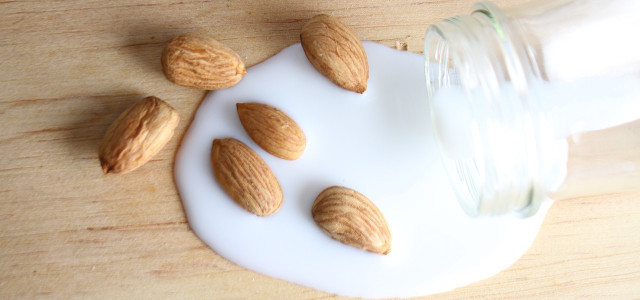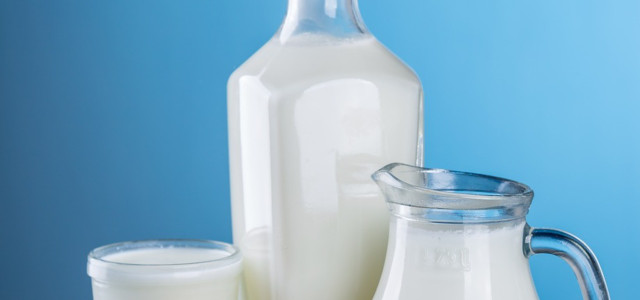Finding the best plant-based milk is a hot topic. With more people making changes, it’s time to clear up the confusion around dairy-free and vegan milk.
The question of what constitutes “milk” has changed drastically in the past few years, to the delight of vegans and plant milk fans. These days, you’re likely to find the best dairy-free milk on the market sharing shelf space with its dairy equivalent. Most cafés and restaurants also offer at least one plant-based milk alternative.
Concerns about health, the environment and animal rights all play into the rising popularity of plant milk. However, there is such a thing as too much choice. With more and more players in the game, it can be hard to work out the best vegan milk for you. Do you prefer a frothy coffee? Is protein the most important issue for you? How good is your favorite plant milk for the environment, really? Let’s take a closer look.
Plant Milk Is the Way Forward
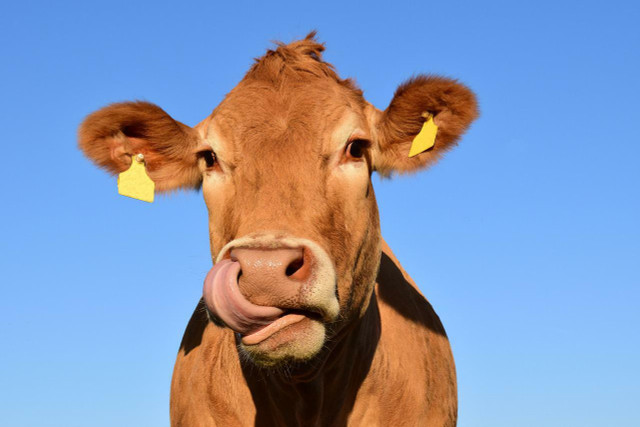
If you’re still on the fence about trying plant milk, it’s worth keeping in mind that you don’t have anything to lose. According to Dr. Dana Ellis Hunnes of UCLA Fielding School of Public Health and UCLA Medical Center,
“There’s really no downside to drinking plant-based milk instead of cow’s milk. Although milk is only one small part of a person’s diet, plant-based milk, along with a plant-forward diet, offers many benefits for your health and the environment.”
Health? Tick. Environment? Tick.
Switching to plant-based milk is also an easy and convenient way to lessen how much your lifestyle harms animals — a popular reason for many making the trade. The cruelty of the dairy industry is now common knowledge, and drinking plant-based milk is a sure-fire way to reduce your impact on the world around you.
It’s official — cow’s milk is out. Make way for the plant milk!
1. Soy Milk
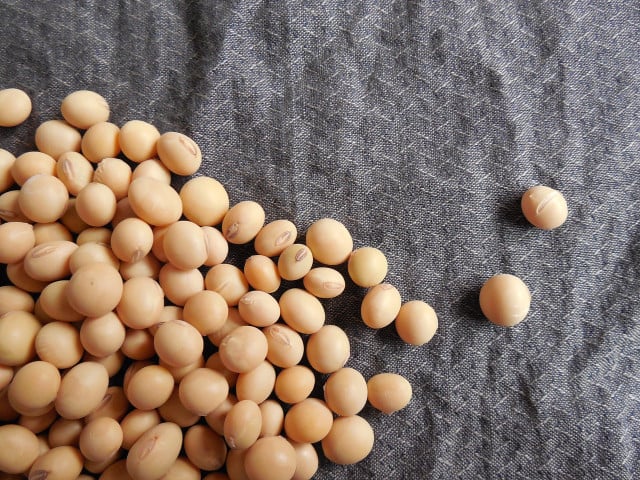


One of the most popular plant-based milk, soy milk, is made by soaking and grinding soybeans, then boiling and filtering the remaining mixture. It’s been popular in East Asia (predominantly China) for centuries, but it only started reaching North American households during the latter half of the 20th century.
Soy milk has a creamy texture and mild, sweet and nutty taste. It is consumed warm or cold and can be made into other milk products, like yogurts.
Pros:
- Accessibility: Soy milk is one of the best-known plant milks. So, it’s likely the easiest to find in stores and eateries.
- Taste and texture: If you’re used to drinking cow’s milk and want something similar, you’ll probably find soy milk the best vegan milk to start with. Even if you’re not, soy milk usually ranks highly with most people in the flavor department.
- Health benefits: Soy milk is an excellent source of protein and calcium, so it’s especially beneficial for vegetarians and vegans. It’s also a great choice for menopausal women, whose bones can become brittle and thus benefit from calcium. Soy isoflavones may also reduce symptoms of menopause, including hot flushes.Furthermore, soy and its derivatives are an excellent source of essential minerals: iron, magnesium, potassium, and vitamins B6, E, K and folate can all be found in soy milk. Many global heart health organizations recognize the cholesterol-busting benefits of soy protein, which you can gain by drinking just two glasses of soy milk a day.
Cons:
- Health drawbacks: Much is heard about the negative health impacts of soy milk. These include increased cancer risks, men developing breasts, reduced thyroid function and even danger to babies’ development. However, these risks are largely unsubstantiated. There is little-to-no proof surrounding any of these claims, as long as soy milk is consumed in normal quantities.
- Added sugars: It’s common for soy milk manufacturers to add sugar to their products. That can make the beverage somewhat less healthy and inappropriate for some recipes. Keep an eye out for sugar-free soy milk.
- Price: Soy milk is typically more expensive than regular cow’s milk. Also, you usually can’t buy it in as large a container as cow’s milk, making it less convenient for large families.
2. Almond Milk
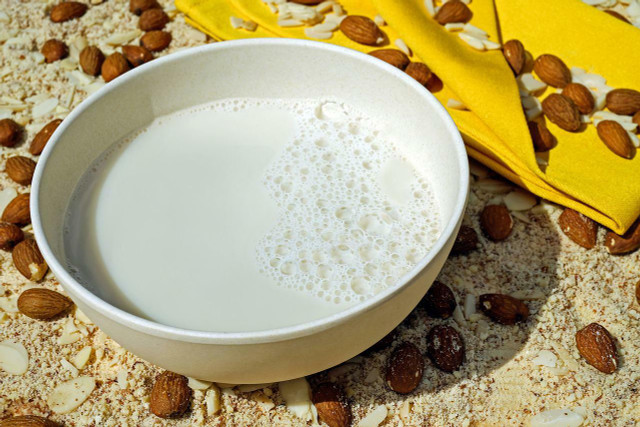


In 2013, almond surpassed soy as the most popular plant-based milk in the US. It’s made from soaked, ground and strained raw almonds. Almond milk has a mild, nutty flavor and a thinner, more watery texture than soy milk. It’s possible to find almond milk products like yogurts, but they’re not as common as their soy-based counterparts (yet)!
Pros:
- Accessibility: Considering it’s the most popular dairy-free milk in the US, you’re bound to find almond milk in almost every supermarket. We recommend the unsweetened versions, but flavored, fortified and sweetened options are also readily available.
- Low in calories: Almond milk, in its pure state, is one of the least calorific plant-based milks. It has about half the average calories per cup than soy milk and a quarter that of whole cow’s milk. That makes it an excellent option for people looking to lose weight.
Cons:
- Low in nutrients: For vegetarians and vegans looking to replace dairy in their diet, almond milk alone will not replace dairy milk’s nutrients. It contains almost no protein and is often sweetened with sugar. Almond milk also contains no natural calcium (but is often fortified with it).
- Environmental impact: It takes a staggering 6,098 liters of water to produce a single liter of almond milk. This is bad news for the environment. When you consider almonds in the US are primarily grown in drought-ravaged California, it can be hard to think of almond milk as a sustainable choice.
3. Oat Milk
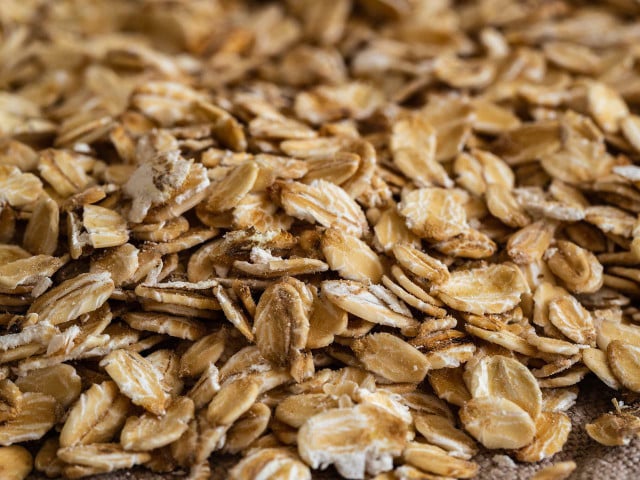


Oat milk is a plant milk made from soaked, ground and strained (or blended) whole or steel-cut oats. It’s enjoyed a recent surge in popularity and is now one of the more common plant milks on the US market.
Because oats absorb water more easily than nuts and other plant milk derivatives, oat milk is creamier once it’s strained — therefore, more nutritious than other milks. It also retains more flavor, which is great if you love oats, and works well in recipes (like this one for delicious dairy-free oat milk pancakes!)
Pros:
- Accessibility: It is readily available in many supermarkets. It’s also cheap, fast and easy to make oat milk.
-
Health benefits: Particularly for vegans, oat milk is probably the healthiest plant-based milk as it’s typically fortified with vitamin B, which can be hard for vegans to get enough of. It also:
- contains more dietary fiber than other plant-based milk
- may reduce cholesterol and lower the risk of heart disease
- has no natural saturated or trans fats or fatty acids
- is an excellent source of protein
- may protect the skin from daily wear and tear, UV rays, pollution and other free radical damage, and boost nails and hair thanks to its added B vitamins.
Cons:
- May contain gluten: Though not an ingredient, gluten can creep into oat milk during the manufacturing process. Gluten can cause digestive issues for people with celiac disease or gluten sensitivity. Check the label thoroughly before purchasing oat milk.
- Sweet flavor: To some, oat milk has a sweet taste, making it unsuitable for savory dishes. The plus side is that oat milk is sweetened less often than other milk.
- Higher in calories: Oat milk is more calorific and has more carbohydrates than other plant milk. This doesn’t make oat milk unhealthy, however. Your body needs calories and carbohydrates.
4. Coconut Milk



Coconut milk is extracted from the grated pulp of mature coconuts. It’s been consumed for as long as people and coconuts have coexisted. It has been — and remains — a significant part of daily diets across Southeast and South Asia, Oceania and East Africa.
Unlike coconut water, which comes from young coconuts, coconut milk is made from ground coconut pulp. That gives coconut milk the sweet, nutty, floral taste of coconuts and a creamy, rich texture. You can make coconut milk at home or buy it in thin or thick versions — the thicker kind is typically used for desserts.
Pros:
- Taste and texture: Coconut milk is an essential ingredient in many curries and soups, thanks to its rich taste, texture, and abundance in some parts of the world. It adds tons of flavor and texture to dishes.
- Health benefits: Coconut milk is very nutritious. It contains a lot of healthy fats and is rich in vitamins C and E (known for their antioxidant properties.) It’s also a rare source of lauric acid. Our bodies convert lauric acid into monolaurin, an antimicrobial, anti-fungal, anti-inflammatory compound that may protect us against infections and viruses.
Cons:
- Calorific: Tinned coconut milk is high in fat and calories, with almost as much fat per cup as single cream. Be wary of how much you add to recipes and how often if you’re watching your weight.
- Price: If you can only find canned coconut milk, it’s probably less appealing for large family meals that require a lot of milk due to convenience and cost.
Other Milks
Every year it seems there’s another new plant milk on the scene. Most of them are made similarly to the other milks — by soaking, grinding and straining the core ingredient. Some different dairy-free milks on the market are:
- Hazelnut milk: Less popular, but one of the healthier milks. A great source of B vitamins, vitamin E, folic acid and other essential nutrients.
- Pea milk: Made using yellow pea protein, pea milk is combined with water and sunflower oil and fortified with micronutrients, thickeners and phosphates. Some people report a slightly bitter taste, but it depends on the brand and your palate.
- Potato milk: Literally boiled potato mixed with water, sweeteners and salt. Potato milk is higher in monounsaturated fats than other plant milk, making it more heart-healthy. Potato doesn’t have a strong flavor, so to many people, it tastes like generic non-dairy milk. Check out our recipe on how to make potato milk!
- Hemp milk: This highly nutritious milk is loaded with proteins and healthy fats. It is one of the healthiest plant-based milks. Home chefs beware — depending on where you live, hemp can be tricky to get ahold of.
- Rice milk: Like potato milk, rice milk is essentially boiled, strained rice. It’s a good source of vitamins A, B12 and D, as well as calcium. Rice milk is a low-fat, low-protein vegan milk option. You can also make it at home easily and cheaply.
- Cashew milk: Cashews do require quite a bit of water to grow, but not nearly as much as almonds. Plus, with when making cashew milk, the entire nut is used as so there is no waste product. This makes it nice and creamy and ideal for making vegan cheeses.
- Flaxseed milk:This small, nutty seed is packed with omega 3 fatty acids, antioxidants and fiber, as well as calcium and vitamins A, B12, and D. Flaxseed milk’s benefits include that it’s one of the rare vegan-friendly plant-based milk options that neither contains nuts, soy, or potentially gluten-contaminated oats.
- Walnut milk:Walnuts are easy to come across in supermarkets, and are a great source of protein and healthy fats. It’s quick and easy to make walnut milk at home, as it is other nut milks!
Best Plant Milks for Environmental Impact



Although the production of plant-based milk causes lower greenhouse gas emissions than cow’s milk, farmed alternatives have their drawbacks, too. Almond milk, for example, uses more water than any other dairy alternative, although it still only requires two-thirds of what cow’s milk uses globally. Also, almonds score well for carbon emissions and land use. The growing demand for soy — mainly used for animal feed rather than milk — is driving deforestation in the Amazon.
Coconut milk’s environmental performance is good when compared to other products. Luckily, coconut trees use a lot less water than dairy cows, and they absorb carbon dioxide from the atmosphere. However, coconut tree farms take up a lot of land and can only be grown in tropical climates.
Oat milk comes out very well in this area. Per liter, it uses only 0.9 kg of carbon dioxide, takes up less than a square mile of land and takes 48 liters of water to produce, including growing the crop and the liquid in the product. These figures are all significantly less than global dairy figures and give it the best overall results of these plant milk studies. Oats can also be easily grown in temperate climates, limiting their potential to cause deforestation or loss of biodiversity.
Best Plant Milks for Coffee



Modern coffees use steamed milk to produce foam by ‘stretching’ the milk. Getting the same effect isn’t as hard as you think with vegan milks. Finding the best non-dairy milk for frothing, texture and taste is subjective and depends on your barista, but here are our thoughts.
Most coffee shops are accustomed to stocking and using soy milk, as it’s been around the longest. Soy milk’s bland taste also means it doesn’t dilute the taste of coffee. It also performs similarly to dairy milk when steamed, making foamy textures in lattes and cappuccinos possible. However, like cow’s milk, soy milk can curdle from both heat and a coffee’s acidity.
Almond milk, unless sweetened, can taste a little bitter in coffee. Some people find its thin texture can water down coffee rather than thickening it, and it can also curdle.
Coconut milk is a great option for coffee. Many people like the flavor combination of coffee and coconut, and its thick fattiness makes it ideal for foam and froth. It’s subjective, but coconut could be the best non-dairy milk for coffee.
Oat milk is another great plant-based milk for coffee, provided you like the flavor — and most people do. Some find they prefer to sweeten their coffee when they take it with oat milk, but it’s also commonly drunk unsweetened. Oat milk is a little thinner than cow’s milk, but it can create a nice foam.
Best Plant Milks for Cooking and Baking



By all accounts, soy milk is a strong contender for the best plant milk for cooking and baking. It can pretty much be used in place of cow’s milk in any recipe, thanks to its mild flavor and creamy texture. It’s also stable at high temperatures and has plenty of protein.
In second place comes almond milk, which can be used in the same ratio as 2 percent and whole milk when baking. Note that your food might bake faster than when you use cow’s milk as almond milk has higher water content. Water will evaporate and cause your baked goods to rise and set more quickly.
Coconut milk is, of course, a wonderful addition to dishes if you want a hit of taste and calories. Soups, curries and treats are commonly made with coconut around the world. Coconut milk can also be used as a substitute for heavy cream. Canned coconut milk is the only dairy substitute that you can reliably whip like whipped cream. But, you need to keep it cold and consider adding a small amount of corn starch for longevity.
Final Thoughts on Plant Milk
About 36% of people in the US are lactose intolerant — a condition that more often affects people of color. “The USDA mandates cow’s milk in schools, and it is the most common food allergy in children under 16,” said Dotsie Bausch, an Olympic cyclist and executive director of Switch4Good, a non-profit organization that promotes giving up dairy. “I have to ask myself, would it ever be acceptable to offer a food staple to Caucasian kids that is not digestible to them?”
Moreover, the retail price of plant-based milk is roughly twice that of dairy milk, according to Mintec, which analyzes food commodity price data. The higher price is attributed to packaging and a more costly blending and bottling process.
Read more:
- Is Almond Milk Vegan? Let’s Take a Look
- Recipe: How to Make Potato Milk
- These 6 Foods are the Worst for the Environment
Do you like this post?








